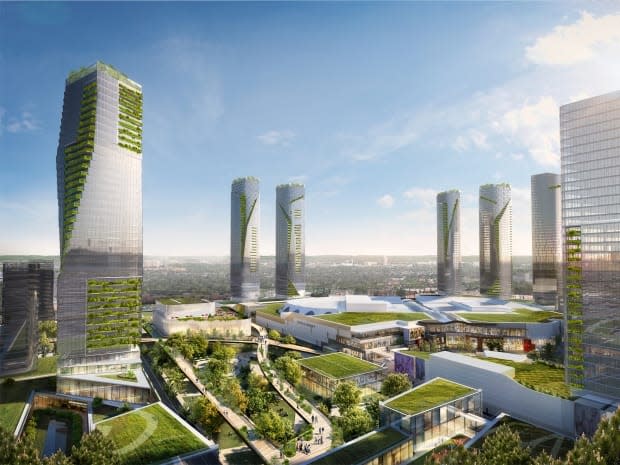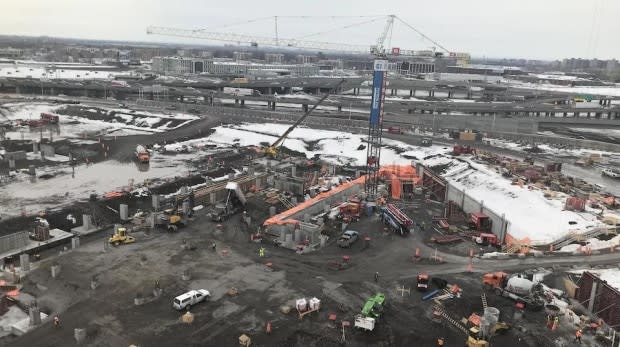Mayor Valérie Plante pans Royalmount project redesign for lack of social housing
After the developers behind the controversial Royalmount project proudly announced their plan to incorporate 4,500 residential units into their redesign of the mega-mall, Montreal Mayor Valérie Plante said the project's lack of social housing is unacceptable.
"There is a housing crisis in Montreal. People have a hard time finding housing," Plante said Tuesday after Carbonleo presented a revamped plan for the project that includes hotels, an aquatic complex, a cinema, offices, restaurants, shopping and public parks.
"This is unacceptable. We are in the metropolitan area. All real estate developers must contribute in one way or another to social housing."
However, Royalmount isn't in Plante's jurisdiction. It will be up to Town of Mount Royal officials to decide if the residential portion of the plan — which would require the site to be rezoned — will get the green light.
After months of consultation and listening to public outcry dating back some five years, Carbonleo said it redesigned the complex to "benefit the metropolitan and local communities," as the company strives to build an environmentally friendly site that incorporates greenery and 3.8 kilometres of pedestrian paths.
"Our vision for Royalmount is completely different than it was five years ago," said Carbonleo president and CEO Andrew Lutfy in a news release.
"We want to create an inclusive place where everyone's values and aspirations will be shared and explored."
The number of non-residential parking spaces has been scaled back by 60 per cent, for a total of 5,000 spots, not including about 2,000 residential parking spaces.
Carbonleo has also promised more green space.
Lufty said Carbonleo now aims to obtain LEED Gold certification for the commercial component of the project, which would have green and white roofs, a rainwater recovery system, geothermal heating and 148 electrical charging stations for vehicles.

If the housing component is approved, Carbonleo will also seek LEED-ND status for the residential development. "ND" stands for "neighbourhood development," integrating principles of sustainability, such as bicycle-friendly design, walkable streets, green buildings and design that incorporates nature.
In a presentation Tuesday afternoon, Lufty said the project will transform the site into an "urban forest," in keeping with those principles.
"We want to bring the rhythm of nature to the city," he said.
Overcoming objections over increased traffic
Carbonleo is still aiming for a 2022 opening of the project's first phase.
With the improvements to the plan and thousands of additional residential units, the total cost of the development is now estimated at $7 billion — up from $1.7 billion when it was first announced five years ago.
The project has faced criticism from the start, with residents and Montreal politicians about the potential negative impact of Royalmount on traffic and existing local businesses.

It is to be built right next to some of the country's busiest roadways, near the intersection of highways 15 and 40.
Carbonleo said it will now integrate several sustainable transportation initiatives, such as a covered foot-and-bicycle bridge to the nearby De la Savane Metro station.
The developer also plans to incorporate an electric shuttle to move people in and around the Royalmount site, as well as to Pierre Trudeau Airport in Dorval and connecting to the REM, the light-rail network now under construction.
It's also proposing roadwork to improve key access routes, such as modifying traffic lights, adding access ramps to nearby highways and widening Côte-de-Liesse Road.

TMR mayor 'happy' about sustainable development
TMR Mayor Philippe Roy said it's hard to predict how much support there will be on council for the residential development, as there are pros and cons.
"There will be a public consultation somewhere in March, so we can hear what the residents of TMR think about it," he said.
As for other aspects of the project, such as the developer's plans to plant half a million trees, shrubs and plants, Roy was enthusiastic.
"We feel this project is getting better and better," he said.
Roy said he is confident with Quebec's help, Royalmount can be integrated into the region's transportation network successfully.
He said it's the ideal time to redesign that network, to meet the growing needs of the community at large.
While Montreal now requires developers to pay a stiff penalty if it fails to include social and affordable housing in plans for any new residential development, TMR does not have any regulations dictating the inclusion of social housing.
Because of that, Roy said, it would be difficult to "impose it on a developer, but it is something that we could discuss."
Mayor Sue Montgomery opposes plan
Côte-des-Neiges–Notre-Dame-de-Grâce Mayor Sue Montgomery dismissed the revised plan, saying in a statement that Royalmount is still a 1980s-style, car-oriented development.
"Our community does not need 5,000 more parking spaces at the Royalmount site," Montgomery said.
"Congestion is already a big problem in the Namur-De La Savane neighbourhood. Royalmount needs to listen to local residents and make this a 21st-century project."

Côte Saint-Luc Mayor Mitchell Brownstein has been working with Roy, Montgomery and other politicians in the city's west end to ensure Royalmount includes adequate public transportation.
He is pushing for the long-delayed extension of Cavendish Boulevard — connecting Côte Saint-Luc to Saint-Laurent with a roadway and an electric tramway that then links to other modes of public transit.
He said he is not against Royalmount, as long as "we have good transit in the area."

